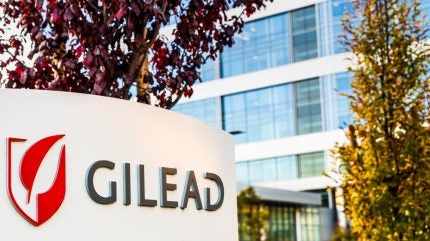
Gilead Sciences has secured the rights to Sprint Bioscience’s preclinical oncology programme for up to $400m, sending Sprint’s stock soaring by more than 110%.
This deal will see Gilead hand over $14m upfront for the three-prime repair exonuclease 1 (TREX1) blocker, which constitutes a novel immunotherapy approach.

Discover B2B Marketing That Performs
Combine business intelligence and editorial excellence to reach engaged professionals across 36 leading media platforms.
Through the agreement, Sprint could see up to $386m in regulatory, commercial and milestone payments, taking the deal’s total consideration up to $400m.
In a 24 November statement, Sprint’s CEO Johan Emilsson noted that the company chose to sell the programme so that the biotech can “shift toward more flexible, value-driven exit opportunities”.
Gilead’s new asset works by inhibiting the TREX1 protein, an exonuclease that plays a key role in DNA replication and repair. While aberrant forms of the TREX1 protein are commonly associated with autoimmune diseases, these proteins also appear to play some role in cancer pathology.
According to Sprint, the inhibition of TREX1 through its preclinical programme can amplify the immune response while inhibiting the further growth of tumour cells.

US Tariffs are shifting - will you react or anticipate?
Don’t let policy changes catch you off guard. Stay proactive with real-time data and expert analysis.
By GlobalDataThe company has proved this in the in vivo setting, with preclinical data revealing that blocking TREX1 can boost type I interferon signalling, while dampening tumour growth.
It appears that the deal has put Sprint on the radar of certain investors, as the company’s share value shot up by 118% from $0.66 at market close on 21 November to $1.55 at market open on 24 November.
Oncology remains a key growth area
This asset acquisition is not the first Gilead has made in the oncology sector this year, having signed six deals in the indication in 2025, according to GlobalData’s Pharmaceutical Intelligence Center.
GlobalData is the parent company of Pharmaceutical Technology.
This includes a licensing agreement with biotech Kymera Therapeutics, which saw the US pharma hand over $750m for the company’s ‘adhesive’ cancer drug in June 2025.
In August 2025, Gilead subsidiary Kite Therapeutics made a bid to enhance its innovative cancer portfolio by acquiring in vivo chimeric antigen receptor (CAR-T) specialist, Interius BioTherapeutics, for $350m.
Across the wider pharma landscape, oncology remains a key target, with the indication being involved in the highest number of deals, with 2,707 deals so far in 2025.
The most valuable deal was signed by Abbott Laboratories, which recently bet on precision oncology diagnostics with its $23bn acquisition of Exact Sciences.
GSK has also signed a deal for up to $12bn with Chinese biotech Hengrui Pharma, which will see the two companies collaborate on the development of up to 12 medicines across multiple therapeutic areas, including oncology.
Meanwhile, Bristol Myers Squibb (BMS) put up to $11bn on the table to join BioNTech in the development of its cancer bispecific antibody, BNT327, in June.
This comes at a time when GlobalData forecasts that immuno-oncology drugs will be one of the most promising areas of innovation over the next half-decade.
This will be driven by advancements in cancer vaccines, CAR-Ts and checkpoint inhibitors, according to Urte Jakimaviciute, senior director of market research and strategic intelligence in the healthcare division at GlobalData.




